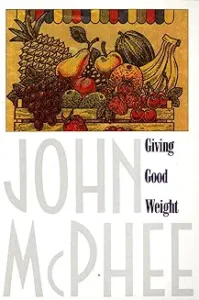Giving Good Weight by John McPhee 1979
The 14th book in McPhee’s incredible ouevre, “Giving Good Weight” is a collection of five essays that initially appeared in The New Yorker between 1975 and 1979, the middle period of a writing career that has stretched from his initial long form bio about Bill Bradley’s basketball days at Princeton to his 2023 collection of vignettes, “Tabula Rasa”. I have all 41 of his books sitting on my shelf in the guest house in Vermont, and take great pleasure not just in re-reading them, but in looking at the books’ spines, their titles, colors, and shapes.
McPhee is a national treasure and a fine example of ‘follow your passions’ and ‘if you’re going to do, do it well.’. From his book about Bradley to one about a 60 year tenure of a prep school headmaster, from an in depth dive into the orange industry in Florida to his Pulitzer Prize winning series about the geology of the American West, and on and on and on, McPhee writes exquisite prose about fascinating topics.
The five essays in this book are great examples of his work, process, and style. The first essay is about the various ‘greenmarkets’ where farmers in the rural areas outside NYC truck their produce into sites in the city from Harlem to Union Square and Brooklyn. He makes a 74 page essay about vegetables and fruit interesting by his deep dive into the family histories of some of the farmers along with funny and touching anecdotes about the interaction between the farmers and the city dwellers. The second essay is about the New Jersey utility’s idea of building floating nuclear power plants off the Atlantic coast while the third and briefest one is about J. Anthony Lukas, the pinball champion of New York. The fourth essay and my favorite is about a two week canoe trip that McPhee takes with seven others up (or is it down???) the St. John’s River, Maine’s wildest and most remote. The title, ‘The Keel of Lake Dickey’ refers to the proposed dam at Dickey/Lincoln which would flood 88,000 acres of woods and streams to provide a meager amount of hydroelectric power. McPhee is a master canoeist and camper and this essay echoes his work in his previous book, my favorite of all of his, “Coming into the Country” about Alaska. Finally, an 80 page essay entitled “Brigade de Cuisine’ tells the story of an obsessive, creative chef and his wife who serve world class meals at their shabby, old restaurant some miles outside of NYC. Being careful to disguise the setting and giving aliases to the chef and his wife, McPhee waxes eloquently about the ingredients, the food, the ambiance, the entire process.
One of the delights about reading essays 50 years after they were published, is that you can learn what happened to people and how certain situations were resolved. For example, 11 years after McPhee wrote about his pinball expertise, Lukas won the Pulitzer, the National Book Award, and the National Book Critics Circle award for the story of Boston’s school busing crisis, “Common Ground”. Tragically, he committed suicide 11 years after that at age 64. I also learned that the hated Dickey/Lincoln dam was never built after a groundswell of popular opposition. Similarly, the Atlantic floating nuclear power plants were never built while the greenmarkets remain a vital and growing part of the NYC experience. Finally, a NYT reporter uncovered the identity of the chef and the location of the restaurant, The Red Fox, not long after McPhee’s article was published.
If you don’t know McPhee, rush out and buy one of his 41 books. At 93, there may be a 42nd one coming, but don’t wait. He’s a phenomenon that we won’t see again in these days of Amazon, audio books, and short attention spans. He’s a master at the essay, a form that I truly love. Read him!



